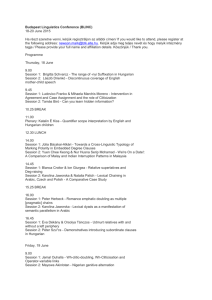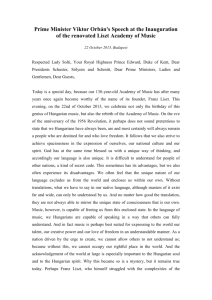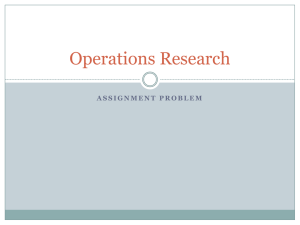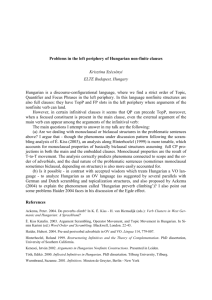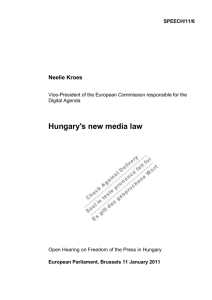specifically regarding local costs
advertisement
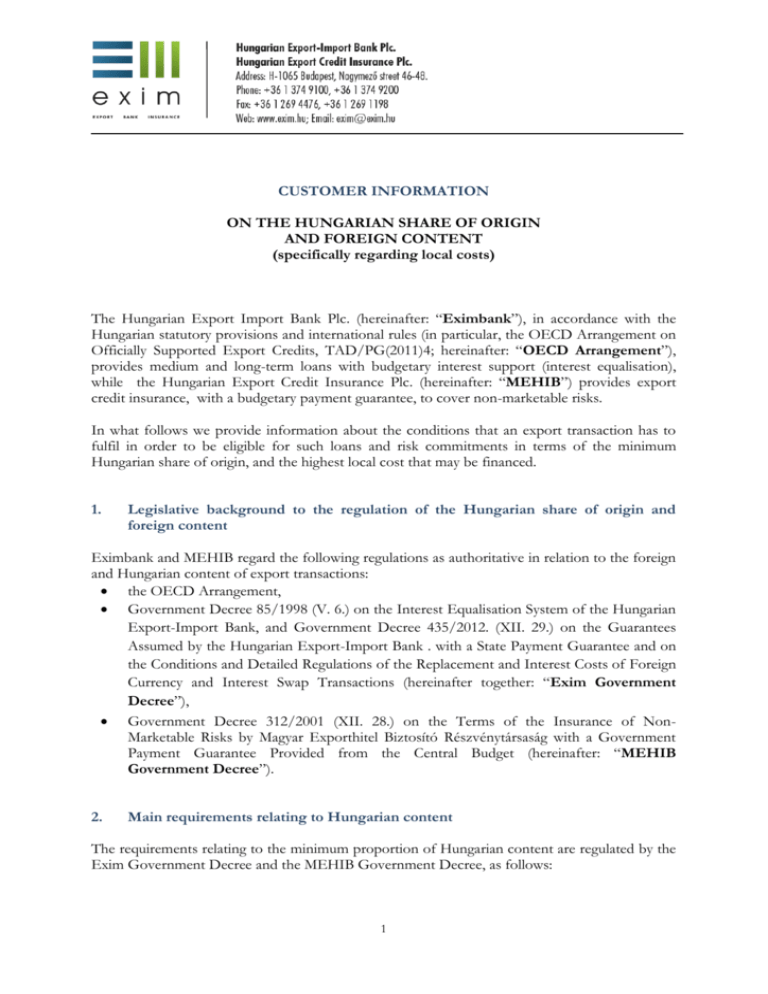
CUSTOMER INFORMATION ON THE HUNGARIAN SHARE OF ORIGIN AND FOREIGN CONTENT (specifically regarding local costs) The Hungarian Export Import Bank Plc. (hereinafter: “Eximbank”), in accordance with the Hungarian statutory provisions and international rules (in particular, the OECD Arrangement on Officially Supported Export Credits, TAD/PG(2011)4; hereinafter: “OECD Arrangement”), provides medium and long-term loans with budgetary interest support (interest equalisation), while the Hungarian Export Credit Insurance Plc. (hereinafter: “MEHIB”) provides export credit insurance, with a budgetary payment guarantee, to cover non-marketable risks. In what follows we provide information about the conditions that an export transaction has to fulfil in order to be eligible for such loans and risk commitments in terms of the minimum Hungarian share of origin, and the highest local cost that may be financed. 1. Legislative background to the regulation of the Hungarian share of origin and foreign content Eximbank and MEHIB regard the following regulations as authoritative in relation to the foreign and Hungarian content of export transactions: the OECD Arrangement, Government Decree 85/1998 (V. 6.) on the Interest Equalisation System of the Hungarian Export-Import Bank, and Government Decree 435/2012. (XII. 29.) on the Guarantees Assumed by the Hungarian Export-Import Bank . with a State Payment Guarantee and on the Conditions and Detailed Regulations of the Replacement and Interest Costs of Foreign Currency and Interest Swap Transactions (hereinafter together: “Exim Government Decree”), Government Decree 312/2001 (XII. 28.) on the Terms of the Insurance of NonMarketable Risks by Magyar Exporthitel Biztosító Részvénytársaság with a Government Payment Guarantee Provided from the Central Budget (hereinafter: “MEHIB Government Decree”). 2. Main requirements relating to Hungarian content The requirements relating to the minimum proportion of Hungarian content are regulated by the Exim Government Decree and the MEHIB Government Decree, as follows: 1 a. With respect to determining and certifying the Hungarian origin of goods, the provisions of Commission Regulation (EEC) No 2454/93 of 2 July 1993 laying down provisions for the implementation of Council Regulation (EEC) No 2913/92 establishing the Community Customs Code, the provisions of section 19 of Act CXXVI of 2003 on the Implementation of Community Customs Law, and the provisions of section 23 of Ministry of Finance (PM) Decree 15/2004. (IV. 5.) on the Detailed Rules for the Implementation of Community Customs Law must be applied, with the provision that the business entity engaged in foreign trade activity is required to obtain the certificate of origin from the Chamber of Commerce’s body authorised to issue it, and to submit it to Eximbank in the case of refinancing, and to MEHIB in the case of insurance. In section 5 (“Comments”) of the certificate of origin, the party requesting the document must indicate the following, depending on whether the application relates to Eximbank or to MEHIB: “For an application for an Eximbank interest equalisation loan or cash loan”, or “For a MEHIB insurance application”. b. The Hungarian content of the service – based on an examination of wage contributions paid in Hungary in respect of employees employed by the domestic business entity providing the service, or by a subcontractor thereof that is classed as a domestic business entity, and of the tools used in the course of providing the service – is determined by Eximbank and MEHIB and verified by them in accordance with the procedure specified in their internal regulations. c. At least a quarter of the value, less financing costs, of a construction or assembly general contractor’s agreement executed by the domestic business entity, or the contract for the performance of services directly related to the construction, must qualify as an export of Hungarian origin, regarding which the Hungarian Chamber of Commerce and Industry issues a certificate of origin. If the Hungarian share of origin is smaller than that prescribed in this paragraph, Eximbank’s financing may only extend to export credit for the Hungarian share of origin, and MEHIB’s assumption of risk – except in the case of the provision of cover in the national interest – may only extend to the Hungarian share of origin. Partial performance is deemed accepted if the Hungarian share of origin at the time of partial performance complies with the Hungarian share of origin predetermined in the implementation schedule or insurance policy. d. At MEHIB, in the case of a Hungarian share of origin lower than that determined in point c.) – which, however, may not be lower than half of the proportion determined in point c.) –, the full credit amount may be insured if the completion of the export transaction is in the national interest. The approval of insurance transactions representing the provision of cover in the national interest is performed by MEHIB’s Board of Directors. MEHIB sets forth in its Business Regulations, and reviews at least once a year, the criteria for determining whether a transaction is in the national interest, and the procedural rules and documentation requirements for the certification thereof. e. In the case of the insurance of domestic supplier’s credit facilities and claims originating therefrom, the supplier is required, for the purpose of certifying the origin of the goods, to submit to Eximbank or MEHIB the certificate of origin, obtained from the Chamber of Commerce’s body authorised to issue it, and to attach the exporter’s declaration to the effect that the exporter is exporting goods that have been supplied by the supplier, or other goods made using them. f. Export investment credit may be provided by Eximbank, and the resulting receivable may be insured by MEHIB, if the investment made using the credit will generate export sales revenue, and if the debtor/insured declares that it will use the investment credit to carry out an 2 investment that facilitates the manufacturing and exporting of goods originating from Hungary, or the provision of services originating from Hungary, and the exporting of such services, in an amount that at least equals the amount of the export investment credit. For the purpose of certifying the origin of the goods, the borrower of the export investment credit is required, at the time of commencing the export, to submit to Eximbank or MEHIB the certificate of origin obtained from the Chamber of Commerce’s body authorised to issue it. For certifying and verifying the origin of the service, the provisions set forth in paragraph (2.b) must be applied. In accordance with MEHIB’s Business Regulations and the General Contractual Conditions applicable to the given transaction, for the assessment of a claim the document specified above, issued by the Chamber of Commerce, must be submitted. 3. Main requirements relating to foreign content Under section 2, paragraph (1), point e) of the MEHIB Government Decree, the foreign content is defined as the products or services supplied or provided by a foreign-domiciled supplier/subcontractor for the fulfilment of an export-oriented foreign trade contract or general contractor’s agreement. Accordingly, the foreign content includes the local costs, as well as the deliveries and subcontractor performances originating from third countries. a. Rules relating to local costs For the purpose of applying the conditions relating to local costs, as set forth in the OECD Arrangement, local costs are defined as expenses – related to the purchase of goods and services – that arise in the buyer’s country and are related to the execution of the export transaction, are necessary for completing the project of which the export transaction forms a part. The local costs do not include the commission payable to the exporter’s agent in the buyer’s country (agent’s commission). In addition to local costs, the OECD Arrangement also defines the concept of export contract value, which is the total amount to be paid by the buyer to the exporter for goods and services constituting the object of the foreign trade contract, not including the local costs. According to section 10. d) of the OECD Arrangement, supported export credit of up to 30% of the export contract value, and the export credit insurance related to this, may be provided for local costs. The cost of export financing and the export credit insurance may not be regarded as a part of the Hungarian share of origin. 3 4. Examination of the local costs related to the export of services, and the examination of Hungarian origin, performed during the credit appraisal, prior to disbursal and in the disbursement period a) Fundamental principles The Hungarian Chamber of Commerce and Industry (MKIK) has the authority to issue certificates of origin. To ensure that the transaction’s compliance with the requirements relating to Hungarian content and local costs can be verified during the bank’s credit appraisal and the insurer’s risk-assumption decision, the exporter must corroborate the expected composition of the general contractor’s agreement (Hungarian and third-country content, and local costs) by including a budget in the credit application, giving a preliminary indication of the subcontractors expected to collaborate in performance, the work processes to be performed by them and the cost requirement of these, the planned deliveries of goods (in an itemised list, giving the expected values of the goods), the expected suppliers, the Hungarian share-of-origin partial performances, and the arising local costs. With respect to fulfilment of the Hungarian share of origin, the object of the examination is the actual subcontractor level. Items that may not be taken into consideration for the purpose of determining the Hungarian share of origin – that is, items that must be deducted from the total performance – are the performances of foreign subcontractors (except Hungarian goods exported by them, or the performances of Hungarian subcontractors engaged by them). The company performing the actual service in accordance with the final (contracted) budget, and designated as a Hungarian subcontractor, is required to declare in writing whether local or thirdcountry subcontractors are involved in the performance of the service. The basis for the examination of the local costs is provided by the General Contractor’s written declaration. b) Preliminary evaluation With respect to the Hungarian share of origin and the local costs, the preliminary evaluation is usually performed by Eximbank’s technical expert. Based on the proposal compiled by the technical expert, Eximbank assesses whether the export transaction, with respect to the local costs, fulfils the requirements prescribed in the OECD Arrangement and the rules of the Exim and MEHIB Government Decrees relating to Hungarian origin. The expert also states an opinion on whether the project can realistically be implemented with the resource allocation and composition indicated in the budget. Eximbank and MEHIB, for the purpose of performing the preliminary evaluation (especially for high-value transactions), reserve the right to designate an independent technical expert. 4 c) Inspections during implementation Eximbank has inspections performed by its technical expert or by an independent technical expert engaged by Eximbank, as an integral part of the implementation and disbursement process, in order to confirm that the Hungarian share of origin stipulated in the contract is actually being fulfilled. The frequency of inspections by the technical expert, and the specific times of the individual inspections, are subject to an agreement between the parties. Prior to disbursement by Eximbank and the provision of cover by MEHIB, the technical expert is entitled to check, on the premises if necessary, the extent of the Hungarian share of origin that is actually being achieved. If the Hungarian content determined in the course of the technical expert’s assessment falls short of the extent, or behind the schedule determined in the contract, Eximbank may suspend disbursement of the loan, on the basis of prior consultation with MEHIB, for as long as the Hungarian content requirement is not fulfilled in accordance with the contractual terms and the statutory expectations. 5

